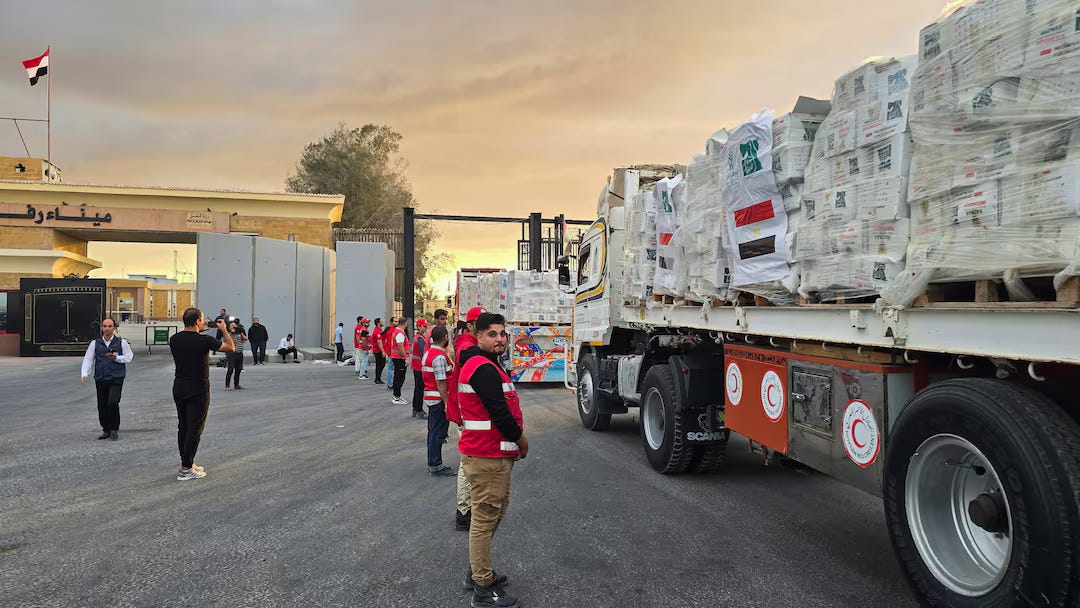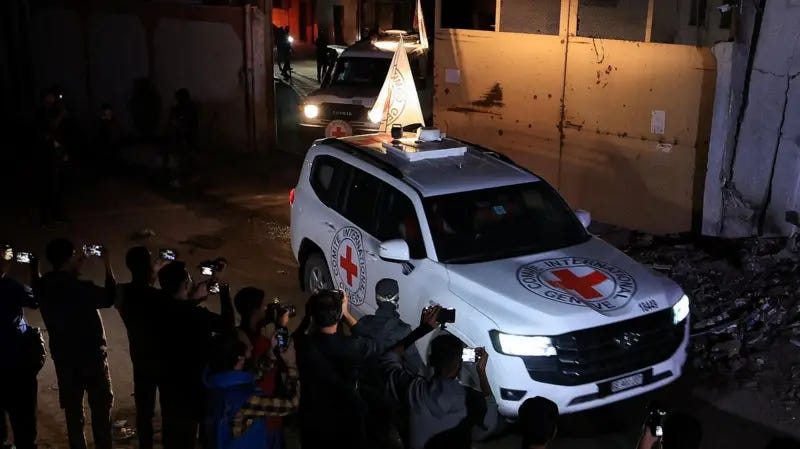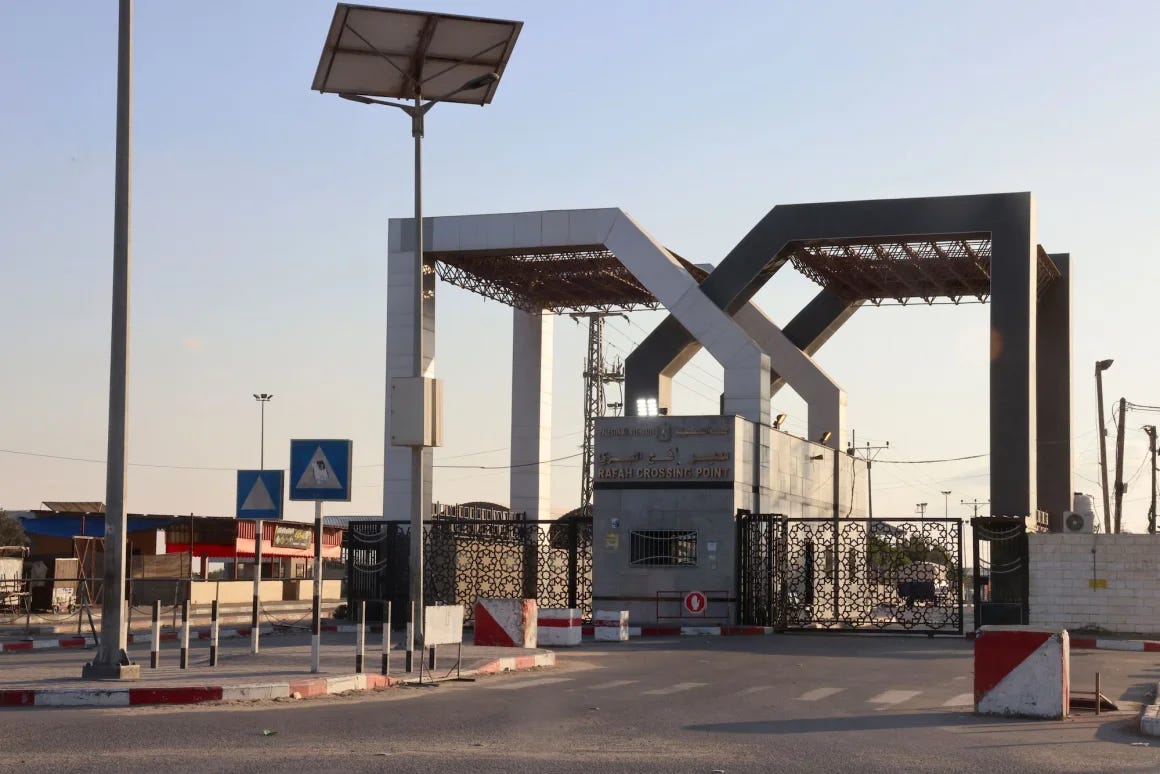Gaza ceasefire tested as Israel halves aid, keeps Rafah border closed

Israel has halved humanitarian aid deliveries to Gaza and kept the crucial Rafah border crossing closed, citing delays in Hamas returning bodies of deceased hostages despite the U.S.-brokered ceasefire agreement taking effect last week. The restrictions threaten to derail the fragile truce even as both sides continue to trade blame over violations of the peace deal.
Aid Deliveries Slashed
Israel notified the United Nations on Wednesday that it would allow only 300 aid trucks per day into Gaza starting immediately, half the 600 truckloads stipulated in the ceasefire agreement. The decision came after Israeli officials accused Hamas of violating the agreement by failing to return all bodies of deceased hostages on schedule.
“Contrary to reports, the Rafah crossing did not open today,” an Israeli security official told NPR, contradicting earlier media reports that the critical border crossing between Gaza and Egypt would reopen as part of the ceasefire terms.
U.N. humanitarian chief Tom Fletcher called on both parties to uphold their commitments, stating that “thousands of trucks a week” are needed to address the humanitarian crisis in Gaza, where famine conditions persist in parts of the territory. The ceasefire agreement originally guaranteed a minimum of 400 trucks daily, according to previous reporting, though Israel had pledged 600 truckloads as part of the deal.
Dispute Over Hostage Bodies

The reduction in aid stems from a dispute over the handover of deceased hostages. Hamas has so far delivered 10 bodies to Israel via the Red Cross, but Israeli officials said one body did not match any of the hostages. Under the agreement, Hamas was obligated to hand over bodies by Monday or share information and “exert maximum efforts” for their recovery.
Hamas’ armed wing countered that recovering additional bodies would require heavy machinery and excavating equipment to access remains buried under destroyed buildings across Gaza. The militant group handed over two more bodies late Wednesday, bringing the total to 10, though Israel said forensic examination found one body did not belong to a hostage.
On Monday, Hamas released the last 20 living Israeli hostages in exchange for approximately 1,700 Palestinian prisoners held without charge and 242 prisoners serving long-term sentences.
Competing Claims of Violations
Both sides have accused the other of breaching the ceasefire. A senior Hamas official alleged that Israel has killed at least 24 Palestinians through shootings since the ceasefire began Friday and provided mediators with a detailed list of violations. Al Jazeera reported that Israel killed at least nine Palestinians on Tuesday, with the Israeli military warning Gaza residents to stay away from areas it still occupies.
The Israeli military did not immediately respond to Hamas’ accusations but previously stated that troops “opened fire to remove the threat” when Palestinians ignored warnings not to approach Israeli ceasefire positions.
Rafah Crossing Remains Shuttered
Israel’s military aid agency COGAT said Thursday that coordination with Egypt is underway to reopen the Rafah crossing for the movement of people, but no date has been set. The agency clarified the crossing would not be used for aid deliveries—only the Israeli-controlled Kerem Shalom crossing would handle humanitarian goods after security inspections.

The Rafah crossing has been closed since Israel seized the Gaza side of the crossing in 2024. Its reopening has been a key Palestinian demand, as it represents Gaza’s only border passage not directly controlled by Israel.
Reconstruction Challenges Mount
As the ceasefire entered its sixth day, Gaza’s residents face enormous obstacles to recovery. The United Nations Development Programme estimated this week that rebuilding Gaza could take more than a decade and cost $70 billion. Most heavy machinery in Gaza is destroyed, and cement and spare parts are urgently needed.
Ismail Al-Thawabta, head of the Hamas-run Gaza media office, told Reuters that aid quantities entering Gaza since the ceasefire are “a drop in the ocean” of what is needed, adding that “the region urgently requires a large, continuous, and organized inflow of aid, fuel, cooking gas, and relief and medical supplies”.
The war, triggered by Hamas’s October 7, 2023, attack on southern Israel, has killed nearly 68,000 Palestinians in Gaza, according to local health authorities—figures the U.N. considers reliable. The attack killed approximately 1,200 Israelis and resulted in 251 hostages being taken to Gaza.
What’s Next
The first phase of President Trump’s 20-point peace plan calls for Hamas to relinquish its weapons and cede power—demands the group has so far refused. Instead, Hamas has launched a security crackdown in areas vacated by Israeli forces, consolidating its control through public executions and clashes with local armed clans.
Palestinian Prime Minister Mohammad Mustafa said Thursday the Western-backed Palestinian Authority would work with international partners to address Gaza’s security, logistics, financial, and governance challenges. An upcoming conference in Egypt will address how reconstruction funds are organized and disbursed.
Israel also released 30 more Palestinian bodies on Thursday, bringing the total received by Gaza’s health ministry to 120 since Monday. Under the agreement, Israel committed to handing over 360 bodies of deceased Palestinian detainees.
Al Jazeera. 2025. “Updates: Israel Kills at Least 9 Palestinians in Gaza Despite Ceasefire.” October 14, 2025. https://www.aljazeera.com/news/liveblog/2025/10/14/live-trump-signs-gaza-ceasefire-deal-with-leaders-of-qatar-egypt-turkiye.
Arraf, Jane. 2025. “Israel Keeps Gaza Border Crossing Closed While Reducing Aid Deliveries.” NPR, October 15, 2025. https://www.npr.org/2025/10/15/nx-s1-5574953/israel-gaza-border-crossing-aid.
Reuters. 2025. “Israel, Hamas Trade Blame Over Truce Violations, Rafah Border Reopening Eyed but No Date Set.” October 16, 2025. https://www.reuters.com/world/middle-east/israel-hamas-trade-blame-over-truce-deal-violations-rafah-border-reopening-2025-10-16/.

